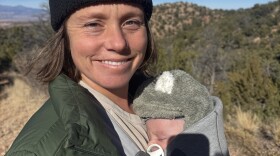
Sarah Tory
Women's Desk ReporterSarah is a journalist for Aspen Public Radio’s Women’s Desk. She got her start in journalism working for the Santiago Times in Chile, before moving to Colorado in 2014 for an internship with High Country News.
Prior to joining APR, Sarah worked as a freelance journalist, reporting on the environment, immigration, and rural communities from across the western U.S. and Latin America. Her work has been recognized by the Canadian National Magazine Awards, The Society of Professional Journalists, the Colorado Press Association, and the Canadian Online Publishing Awards. She was born and raised in Toronto, Canada and has called the Roaring Fork Valley home since 2018.
When she’s not working on stories, you can find her in the mountains, most often rock climbing or backcountry skiing.
-
For longtime ski racer Jessie Young, the debut of ski mountaineering at the upcoming Olympics marks the culmination of her two-year journey to earn a spot on Team USA — and the heartbreaking reality of elite sports.
-
La eliminación del calendario de vacunación recomendado por los Centros para el Control y la Prevención de Enfermedades (CDC) de la vacuna contra la gripe se produce en un momento en que Colorado y los Estados Unidos se enfrentan a la peor temporada de gripe en décadas.
-
The decline reflects a broader statewide trend that will result in smaller public school budgets, but Roaring Fork School District staff still overestimated the number of students it expected would enroll this fall.
-
Removing the flu vaccine from the Centers for Disease Control and Prevention's recommended vaccine schedule comes as Colorado and the U.S. face the worst flu season in decades.
-
Organizers with Mountain Action Indivisible hoped the vigil would inspire collective action against federal immigration agents’ aggressive tactics under the Trump Administration.
-
En la última parte de una serie de tres, la periodista Sarah Tory habla con Cynthia Ayala sobre cómo la caída de la tasa de natalidad refleja la creciente autonomía de las mujeres sobre sus cuerpos y sus vidas.
-
The new law took effect on Jan. 1, 2026, overturning a 40-year ban on using public money to pay for abortions.
-
En la segunda entrega de una serie sobre la caída de las tasas de natalidad, Amelia Dotzenrod habla sobre por qué esperó hasta los treinta y tantos años para tener un hijo.
-
LIFT-UP interim executive director Elyse Hottel reflects on the lessons learned from the SNAP crisis and her final weeks leading the organization.
-
In the last of a three-part series, reporter Sarah Tory talks to Cynthia Ayala about how falling birthrates reflect women’s increasing autonomy over their bodies and their lives.









